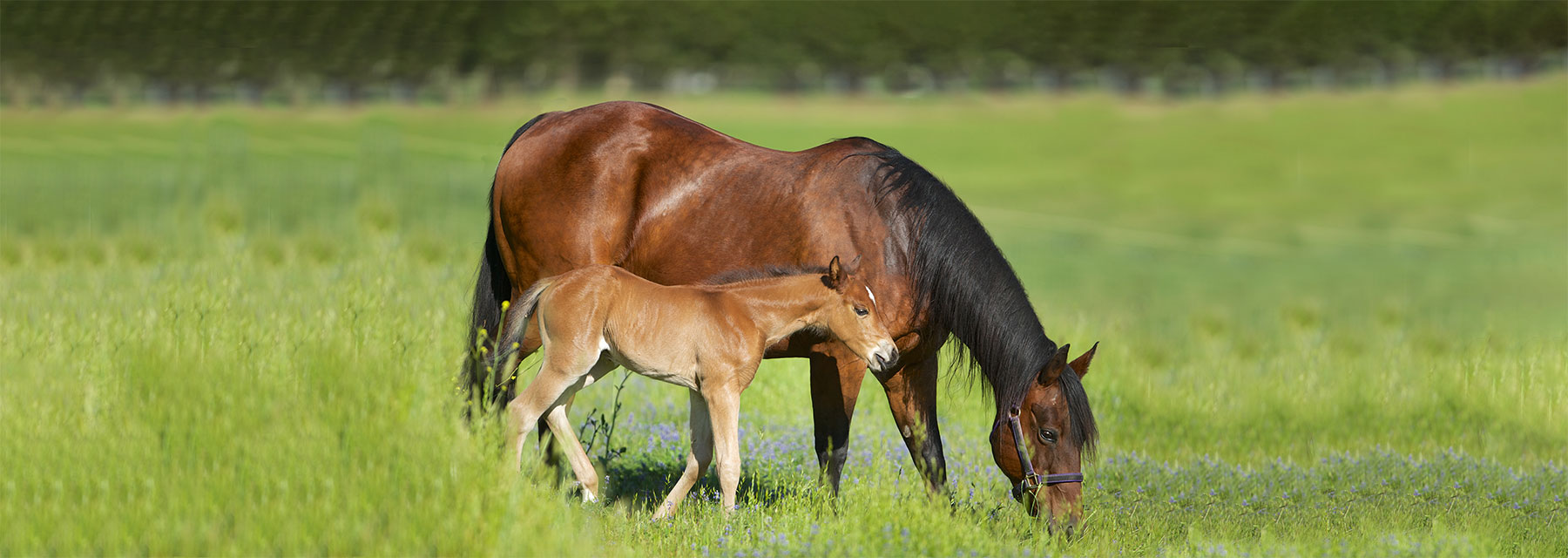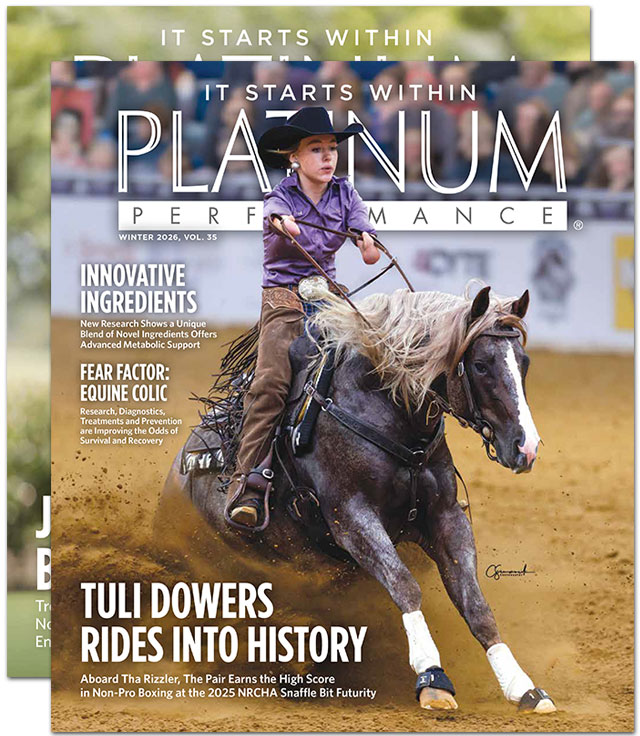What to Expect in Weaning Season
Aside from the lactating mare, the growing foal is the most demanding life stage in terms of nutrition. After foaling, the mare’s milk is perfect nutrition for the new foal that provides energy, protein and other essential nutrients to support healthy growth and development. After about two to three months, milk production begins to taper and additional nutrients will be needed by the foal to support his rapidly growing body. Young, growing horses seem to be able to adapt to a wide variety of nutritional management systems. The keys to any feeding program for developing horses is the same: to provide adequate, balanced nutrients and nurture a moderate, even rate of growth.
As is true for all mammals, the importance of the mother’s milk from birth through weaning is indisputable. While still nursing, a foal will relatively quickly take an interest in sampling forage. This early testing of forage will kick-start the development of the bacterial microflora, which will eventually inhabit the gastrointestinal tract. This critical network of “good” bacteria in the hindgut enables the horse to uniquely derive energy from structural carbohydrates from forage. Whether already weaned or still at the mare’s side, the young horse will consume a diet that will mostly consist of grass, usually by six months of age.
The horse is a non-ruminant herbivore that is specifically designed to take advantage of forages as its primary dietary source. Forage, in the form of pasture grasses and hay, is not dietary fluff, but rather packed with essential nutrients including energy, protein, vitamins, minerals and fiber. It is the best foundational feed source for a growing horse. The natural rhythm of the foal correlates beautifully with nature. When he is still nursing, yet just starting to experiment with adult feed, is when the spring grass is popping up across the country. This is not coincidental but rather nature’s perfect way of ensuring that correct nutrition is available for his evolving body.
The Stress of Weaning
Weaning is a time filled with substantial changes for a young horse. It can be a stressful period in several ways. Whether it is done gradually or abruptly, being separated from the mare is a major adjustment. In addition to the psychological stress of being separated from the mare, there are significant physical and nutritional changes taking place as well. These contributing factors can be disruptive to the still-developing digestive system and can potentially impact feed intake and growth. A basic rule for feeding any horse is to minimize changes in the diet. The weanling will inherently be faced with feeding changes as milk from the mare will be discontinued at the time of weaning. Beyond ensuring that general nutritional needs are met, providing a prebiotic and probiotic the weeks prior to weaning and through the weaning process can provide immense benefit to the weanling. Platinum Balance® is an exceptional prebiotic and probiotic to offer support throughout the weaning process. Weaning can also make young horses more susceptible to gastric ulcers. It is good protocol to put the weanling on a preventative treatment plan for ulcers that includes Platinum Gastric Support®. This formula is used to support healthy levels of gastric acid and maintain normal stomach function during weaning. Lastly, if the weanling develops stress-related loose stool, Bio-Sponge® can help to support healthy gastrointestinal function. When the weanling has acclimated and stools have solidified, Bio-Sponge® may be discontinued.
It is imperative to make sure that the weanling has a strong dietary foundation and any nutritional gaps are filled in prior to the stress of weaning. With increased levels of cortisol circulating, an immature immune system can more easily be suppressed leaving the weanling susceptible to illness. An ounce of prevention is worth a pound of cure to ensure the weanling does not fall ill and need to be doctored during an already stressful, immune-compromised time period. As soon as the foal can nibble grass, add Platinum Performance® Equine to his diet. This omega-3 essential fatty acid supplement is complete with vitamins, minerals and antioxidants. Platinum Performance® Equine offers ingredients to support all areas of health including the digestive and immune systems, as well as provides critical nutrients for growth and development.
Developmental Orthopedic Diseases
Nutrition has a direct impact on the current and also future health of the horse. It certainly offers support to the foal’s immune and digestive systems, but the diet is notably linked to the future athletic potential of the growing horse. There are many physical changes happening during the general weaning stage. Muscle is being added onto a skeletal system that is undergoing fast modifications. Bones, tendons and ligaments are strengthening and hardening. Optimal bone and soft tissue development are greatly influenced by nutrition. This rapid developmental time is when young horses are most vulnerable to developmental orthopedic diseases (DODs). The DODs collectively refer to problems in the bones, joints and soft tissues of young horses, which include osteochondrosis, osteochondrosis dessicans, physitis, cervical malformations, contracted tendons and angular and flexural limb deformities. There are genetic and environmental factors that contribute to DODs, but nutrition has been shown to have influence as well. Some of the nutritional factors linked to DODs include an abnormal or inverted ratio of calcium to phosphorus, copper and zinc deficiencies, excessive body condition and rapid growth rate due to overfeeding. Supplying these minerals in the correct amount and ratio and monitoring body condition may be influential in preventing DODs.
Providing a source of omega-3 essential fats may support normal levels of inflammation and offer internal support for the added strain put on developing joints and soft tissues.
Silicon has been established to play an important role in the development, growth and maturation of bones and other connective tissues. Several studies indicate that an insufficient amount of silicon in the diet is associated with poor growth rates, developmental abnormalities and a reduction in bone collagen and mineral content. Conversely, supplementation with silicon can support normal bone mineral content and formation, possibly by increasing calcium incorporation into bones. In addition to bone, silicon supplementation may promote cartilage collagen content in animals. For these reasons, supplementation with Platinum’s Osteon® is recommended throughout development of the young horse. Supplementation in the late pregnant mare may also be prudent as foals that nurse from mares supplemented with Osteon® have shown a significant increase in serum silicon.
Feeding Growing Horses
The key to feeding all growing horses, including weanlings, is to ensure the diet is balanced and dense with nutrients, including vitamins, minerals, lysine and crude protein but without providing excess calories. Excess weight can be problematic for soft tissues that are still forming. One of the best ways to gauge a young horse’s weight is to examine body condition and make feeding adjustments as needed. High-grain or high-energy diets may influence hormonal fluctuations that can be problematic for skeletal development. Starch and sugar intake should be minimized. Instead, optimize pasture and hay by providing it free-choice for a healthier diet. Constant turnout with access to pasture will supply many vitamins and minerals, as well as allow opportunity for exercise. This nurtures the growing musculoskeletal system by increasing bone density and strengthening cartilage through consistent low-impact movement. A source of omega-3 fatty acids should be offered in the diet of a growing horse. They are important for normal bone mineral content, density, strength and growth. Omega-3 fatty acids support normal levels of inflammation and may promote normal bone mineral content.
Weaning is the time when many changes are happening to the growing horse over a relatively short period of time. Aside from the mental stress of being separated from the mare, there is also the physical stress of a rapidly-developing body. The weanling must deal with additional environmental stress that may require special therapeutic dietary support, but the nutrient basics for all developing horses are similar. Adequate and balanced vitamin and mineral intake is paramount with a focus on steady growth. The early growth of a horse is arguably the most pivotal life stage regarding nutrition. A sound nutritional foundation provides the support required for a smooth transition into becoming a healthy adult horse.
Growing Horse Protocol Timeline
| 2 Months Old through Weaning | Platinum Performance® Equine Platinum Balance® |
| 2-4 Weeks Prior to Weaning through Weaning | Platinum Performance® Equine Platinum Gastric Support® Platinum Balance® Bio-Sponge® |
| Weaning through Adult | Platinum Performance® Equine As the horse grows closer to full size, Platinum Performance® Equine can be increased to 1 scoop twice daily. Osteon® For young horses at a higher risk for developmental orthopedic diseases, administer 1/2 scoop twice daily to supply a bioavailable source of silicon. Supplementation with silicon supports normal healthy bone mineral content and formation. |

by Emily Smith, MS,
Platinum Performance®

